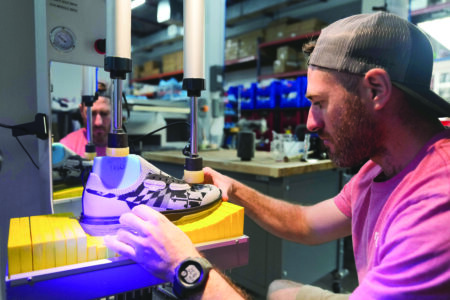More light, more eggs: Negaunee high schoolers put solar panel kit to good use

The Negaunee High School environmental science class has received $200 from Honor Credit Union, which was used for a solar panel kit. From left are Tianna Williams, Breydon Gagnon, Chase Collick, Nolan Rhome, Peyton Mahoski and John Schouten. (Photo courtesy of Todd Backlund)
NEGAUNEE — It’s no big secret that sunlight is at a premium this time of year in the Upper Peninsula.
To get around this meteorological fact of life, Todd Backlund’s environmental science class at Negaunee High School used money it received from a local bank for a solar panel kit.
Jamie Gollakner, regional manager of Honor Credit Union, awarded the class $200 for classroom supplies — in this case, it went toward the purchase of the kit used for the class’s chicken pen, along with some accessories.
Backlund said the kit
- The Negaunee High School environmental science class has received $200 from Honor Credit Union, which was used for a solar panel kit. From left are Tianna Williams, Breydon Gagnon, Chase Collick, Nolan Rhome, Peyton Mahoski and John Schouten. (Photo courtesy of Todd Backlund)
- A solar panel kit helps the Negaunee High School chicken pen. (Photo courtesy of Todd Backlund)
The new system is less cumbersome than moving the heavy battery in and out of the high school.

A solar panel kit helps the Negaunee High School chicken pen. (Photo courtesy of Todd Backlund)
“We always had to haul the battery in, usually twice a week, charge it up, bring it back out and then bring it back in at the end of the week, (and) charge it up for the weekend,” Backlund said.
He called it a “deep-sea kind of marine battery.”
“It’s not really a lightweight battery,” Backlund said.
That’s why he wrote the grant for a solar panel kit as well as an inverter, which will run the timer and the lights, and change the direct current battery power to alternating current power, Backlund said.
During the winter, daylight hours get down to the point where chickens stop laying their eggs.
“They see that it’s not a good time to have their babies,” Backlund said.
The additional daylight made possible through the solar panel kit, then, willgive them more daylight and, it is hoped, will allow them to produce eggs all winter.
Apparently the students are appreciative of the new addition, with Backlund passing on some of their comments via email.
Senior Nolan Rhome said he likes not having to haul the battery into the classroom to charge it twice a week since the battery is “extremely heavy and cumbersome.”
Senior John Schouten said the solar panel is good for the environment because the students use renewable energy source versus an energy source derived from the burning of fossil fuels to charge the battery.
Junior Riley Liquia said the solar panel provides them with the means to extend the amount of light the chickens receive in the winter.
“By providing the extra light, the chickens will hopefully continue to lay eggs all school year,” Liquia said.
The eggs have a culinary purpose too.
Backlund said they are used in cooking lessons, with some eggs sold to school staff.
“This year, we made French toast a few times,” he said. “We made egg bakes where they use the eggs, and then you just kind of show them how easy it is to put all the stuff together and you don’t have to sit and cook the eggs. You just put them all in and then throw them into the oven and bake them, and then you have everything all at once, kit and caboodle, because we usually do potatoes in the egg bake, and ham. We got sausage.
“Each time we make it, we make it a little bit different so they can see pretty much the same premise, but it you can make it however you want to make it.”
The solar panel project also had a problem-solving component, which was unexpected.
Backlund said the solar panel kit didn’t work when it was first set up, so he gleaned a few troubleshooting ideas from the company that made the kit.
“The kids got a chance to problem-solve and figure out whether or not the voltage was coming through,” said Backlund, who noted it also could have been a faulty controller or connectors.
They eventually discovered the solar panel itself was broken, so a new panel was sent to them, Backlund said — and the students finished the project successfully.
“It was up and running in no time,” he said.
Christie Mastric can be reached at 906-228-2500, ext. 250. Her email address is cbleck@miningjournal.net







